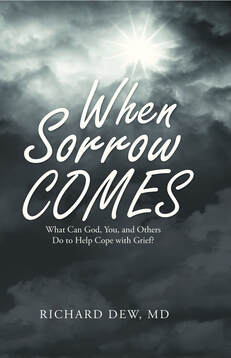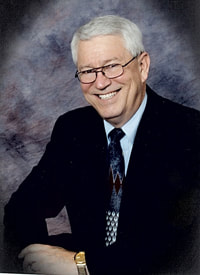Author and physician turns a tragic event into restorative support for grieving families

For Immediate Release (Knoxville, TN) — A study on grief and loss from WebMD and Amerispeak found that 65% of people going through a loss experience some sort of physical ailment in addition to feeling sadness (83%), depression (42%), or anger (29%). Dr. Richard Dew knows this study is accurate. He observed the grief of others for many years as a physician, but when his own son was murdered at the age of 21, it became very personal. What he has learned through his grief and how he is helping others cope is the subject of his latest book entitled “When Sorrow Comes: What can God, You and Others Do to Help Cope with Grief? ”
“My son’s death irrevocably changed my life,” says Dew. “It’s been said that when you lose your parents, you lose your past, but when you lose child, you lose your future. Only six weeks after our son was murdered, my dad died of Lou Gehrig’s disease. My whole life I heard sermons and read scriptures assuring me of help and comfort in times of need. I did not feel accompanied nor comforted. I worried all the stuff I had claimed to believe might not be entirely true, or worse yet, was not true at all. In truth, God was there all the time. I was just so caught up in grief and frustration, and was complaining so loudly, I neither heard nor recognized Him.”
Dr. Dew says for most people, even those who have grown up in church, the loss of a loved one can become a spiritual crisis.
“Many if not most, resent others’ interpretations of God’s purposes in their loss,” says Dew. “There are numerous things I list in the book that are helpful and non-helpful to grieving people. An example would be saying something like ‘It was God’s will’ or ‘God never gives us more than we can bear.’ These are cliches that are often quite hurtful to someone who is grieving. One of my best friends is always emotionally in control. I had never seen him elated, depressed, or unusually angry. He was the first to arrive at my home after my son’s death was announced at our church. Seeing me, he exited his car, ran to me, threw his arms around me, and wept uncontrollably. Stunned, I patted him on his back until he stopped sobbing. He then abruptly released me, rushed back to his car, and left. This is one of the few things I remember from that time, and he didn’t say a word.”
Dew hopes “When Sorrow Comes” helps those who are grieving, but also offers guidance to those that want to help those who are experiencing loss.
“My goal in writing this book is threefold: to help those who have lost a loved one to better understand their grief; to assist them in navigating their grief journey in such a manner that they may emerge emotionally healthy, spiritually at peace, and personally happy; and to help those who want to comfort the bereaved to understand what they are experiencing and how best to offer consolation, aid, and relief.”
Dr. Dew has lectured on coping with grief and loss in medical schools and spoken to numerous professional groups and churches. Though retired, Dr. Dew continues to volunteer at a local clinic for the uninsured as well as counsel people who have lost loved ones. He says his willingness to share his story and help others has been part of his own healing.
“There are always a lot of ‘Why’ questions when you face a tragedy or loss,” says Dew. “Why did this happen? Why this person? But I found the most effective way of dealing with all these Whys was to consider I might be asking the wrong question. Instead, I began asking, ‘What now?’ Given this terrible thing that had happened, what was I going to do with it? I have dedicated my writing, working with bereaved families, and volunteering at a clinic to my son, Brad. This is his memorial. I am convinced one of the most powerful forces in coping with grief is to do things that bring meaning to us and our loved one’s life.”
“My son’s death irrevocably changed my life,” says Dew. “It’s been said that when you lose your parents, you lose your past, but when you lose child, you lose your future. Only six weeks after our son was murdered, my dad died of Lou Gehrig’s disease. My whole life I heard sermons and read scriptures assuring me of help and comfort in times of need. I did not feel accompanied nor comforted. I worried all the stuff I had claimed to believe might not be entirely true, or worse yet, was not true at all. In truth, God was there all the time. I was just so caught up in grief and frustration, and was complaining so loudly, I neither heard nor recognized Him.”
Dr. Dew says for most people, even those who have grown up in church, the loss of a loved one can become a spiritual crisis.
“Many if not most, resent others’ interpretations of God’s purposes in their loss,” says Dew. “There are numerous things I list in the book that are helpful and non-helpful to grieving people. An example would be saying something like ‘It was God’s will’ or ‘God never gives us more than we can bear.’ These are cliches that are often quite hurtful to someone who is grieving. One of my best friends is always emotionally in control. I had never seen him elated, depressed, or unusually angry. He was the first to arrive at my home after my son’s death was announced at our church. Seeing me, he exited his car, ran to me, threw his arms around me, and wept uncontrollably. Stunned, I patted him on his back until he stopped sobbing. He then abruptly released me, rushed back to his car, and left. This is one of the few things I remember from that time, and he didn’t say a word.”
Dew hopes “When Sorrow Comes” helps those who are grieving, but also offers guidance to those that want to help those who are experiencing loss.
“My goal in writing this book is threefold: to help those who have lost a loved one to better understand their grief; to assist them in navigating their grief journey in such a manner that they may emerge emotionally healthy, spiritually at peace, and personally happy; and to help those who want to comfort the bereaved to understand what they are experiencing and how best to offer consolation, aid, and relief.”
Dr. Dew has lectured on coping with grief and loss in medical schools and spoken to numerous professional groups and churches. Though retired, Dr. Dew continues to volunteer at a local clinic for the uninsured as well as counsel people who have lost loved ones. He says his willingness to share his story and help others has been part of his own healing.
“There are always a lot of ‘Why’ questions when you face a tragedy or loss,” says Dew. “Why did this happen? Why this person? But I found the most effective way of dealing with all these Whys was to consider I might be asking the wrong question. Instead, I began asking, ‘What now?’ Given this terrible thing that had happened, what was I going to do with it? I have dedicated my writing, working with bereaved families, and volunteering at a clinic to my son, Brad. This is his memorial. I am convinced one of the most powerful forces in coping with grief is to do things that bring meaning to us and our loved one’s life.”
About Dr. Richard Dew:

Richard Dew, MD, has been a family physician in east Tennessee for over 50 years, and currently volunteers as the Medical Director for a faith-based clinic for the uninsured in Sevierville. Following the death of his son, he became active in the international support group for families whose children have died called Compassionate Friends, serving on their national Board of Directors. He is the author of three previous books “Medicine with a Human Touch, ” “Rachel’s Cry: A Journey through Grief,” and “The Other Side of Silence.” He and his wife, Jean, live in Knoxville, Tennessee. For more information visit http://rdewbooks.com.
###
###